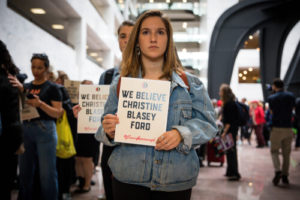2018 Whistleblower of the Year Candidate – Dr. Christine Blasey Ford

“I am here today not because I want to be. I am terrified. I am here because I believe it is my civic duty to tell you what happened to me while Brett Kavanaugh and I were in high school.” On September 27, 2018, tens of millions of Americans stopped to hear Dr. Christine Blasey Ford say these words, under oath, to the Senate Judiciary Committee. They huddled around airport televisions, gathered in bars, and secretly streamed her testimony at work. Many sought isolation and solitude, bracing for testimony that would stir their own painful memories.
They listened as Ford described her assault in agonizing detail. “He began running his hands over my body and grinding his hips into me,” Ford testified. “I believed he was going to rape me. I tried to yell for help. When I did, Brett put his hand over my mouth to stop me from yelling. This is what terrified me the most, and has had the most lasting impact on my life. It was hard for me to breathe, and I thought that Brett was accidentally going to kill me.” Drawing on her Ph.D. in psychology, Ford explained how Kavanaugh’s “uproarious laughter” remained “indelible in the hippocampus” over thirty-five years later.
Ford hesitated to share this experience because she knew what would come: That didn’t happen. It’s not that big of a deal anyway. It happened decades ago. Why is she only speaking up now? Why can’t she remember this detail? What’s her real motivation? He’s a good man, and she is going to ruin his life. And predictably, Dr. Ford faced more than just probing questions. She still receives death threats, which have forced her to move four times and hire a private security detail, and she has not returned to her professorship at Palo Alto University.
Ford knew this backlash would come, but she spoke up anyway. And millions of Americans heard truth in her testimony. For many, it was the first time they had heard Ford’s account, but they knew this story well. In the room, numerous observers were moved to tears, including Senator Amy Klobuchar. Online, #WhyIDidntReport flooded social media, as women revealed their own suppressed stories of sexual assault. Even President Trump conceded that she was a “compelling” and “credible” witness.
When it was his turn to speak, Kavanaugh angrily denied the assault. He called Ford’s accusations a “grotesque and coordinated character assassination” fueled by “revenge on behalf of the Clintons.” He claimed the ordeal would permanently damage his good name and even prevent him from coaching his daughter’s basketball team. And he noted ominously that “what goes around comes around.”
The Senate confirmed Kavanaugh one week later. Despite his concerns, Kavanaugh has already resumed coaching his daughter’s basketball team and “was hailed as a conquering hero” upon returning to Georgetown Prep, his school at the time of the alleged assault. Recently, a panel of federal judges dismissed all 83 ethics complaints filed against Kavanaugh. His confirmation placed him beyond the reach of the Judicial Conduct and Disability Act. For as long as he is willing and able, Kavanaugh will hold one of the most powerful positions in government.
Ford’s testimony, however, was never solely about Kavanaugh and his fitness for the high court. It was inextricably linked to a national reckoning over sexual misconduct by men and the immense toll exacted from survivors who confront them. On that score, Ford’s testimony was both a marker of progress and a piercing reminder of the challenges ahead. Twenty-seven years after Anita Hill’s testimony, the outcome was the same, but the conversation was notably different. Unlike the skewering of Hill, Ford received praise and support from many committee members, while her critics largely shrunk from the moment, outsourcing their questions to a hired prosecutor. Ultimately, more Americans believed Ford than Kavanaugh, a sharp reversal from the Hill hearings. As journalist Haley Sweetland Edwards explained, Ford “showed that speaking up does matter—that the world is listening, even if the people in front of you are not.”
Ford’s testimony sparked a moment of empowerment and advocacy that will reverberate for years. Recall, it was two other survivors, stirred by Ford’s testimony and tearfully describing their own assaults, who pushed Senator Jeff Flake to reverse course. Even as her life remains upended, Ford has used her platform to advocate for survivors and promote other courageous whistleblowers. In her first public comments since her testimony, Ford presented Sports Illustrated’s Inspiration of the Year award to Rachael Denhollander, the first woman to publicly accuse former USA Gymnastics doctor Larry Nassar of sexual assault. “In stepping forward, you took a huge risk and you galvanized future generations to come forward, even when the odds are seemingly stacked against them,” Ford said. “The lasting lesson is that we all have the power to create real change, and we cannot allow ourselves to be defined by the acts of others.”
Ford did not want to testify, but we are better off because she did. Like the many other whistleblowers fueling the #MeToo movement, Ford came forward at great personal cost, sacrificing the privacy and security of her established life with little assurance that her words would matter. But because of her bravery, countless others will find the courage to come forward, and some men will reflect on their own conduct, reconsidering acts that were once widely accepted. For her selflessness, courage, and historic role in the #MeToo movement, we nominate Dr. Christine Blasey Ford for Whistleblower of the Year.
Read about all of our Whistleblower of the Year Candidates:
- Cambridge Analytica Whistleblower Christopher Wylie
- Child detention whistleblowers Dr. Pamela McPherson and Dr. Scott Allen
- The Center for Investigative Reporting and Reveal
- Church abuse whistleblower Siobhan O’Connor
Vote here for the Whistleblower of the Year
Tagged in: Whistleblower of the Year,